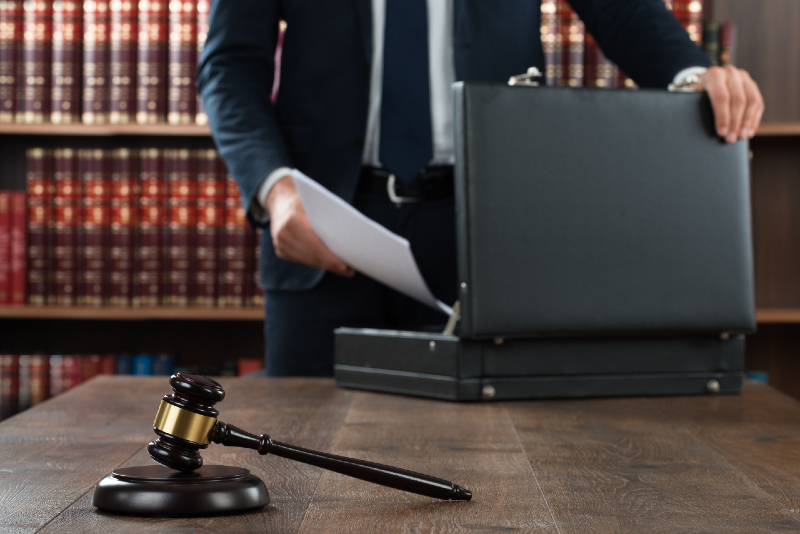In Maine, if you get charged with OUI, the Bureau of Motor Vehicles (BMV) will move quickly to suspend your driver’s license, independent of what happens with your criminal charges in court.
Now in private practice as an OUI defense lawyer at Nichols & Tucker, my past experience as a former BMV hearings officer and BMV’s primary attorney and director of legal affairs gave me the background to explain how this works from the inside.
When a law enforcement officer makes an arrest, and/or issues you a summons for an OUI charge, the officer has to write a report and send it to the BMV within several days. At BMV, clerks in the OUI Section will review the report, make sure it has basic supporting information, like the results of a breath or blood test (if a test took place), and then they will generate a Notice of Suspension and mail it to your address on record.
The Notice of Suspension
The Notice of Suspension will tell you:
- why you will be suspended
- when your suspension will start and
- for how long you will be suspended
If you are charged with OUI, you must immediately make sure that BMV has your correct address. If your address is not the same as on your license, you need to visit a BMV branch as soon as possible and update your address. If BMV has an old address, and you don’t see the Notice of Suspension, your license will go under suspension anyway and you might not know.
Even if you literally do not see your Notice, and then you get stopped by police after it goes into effect, you could be charged with Operating After Suspension and be facing a new criminal charge, and an additional – and longer – license suspension.
When you receive your Notice in the mail, read it VERY carefully.
The Notice is a form letter that is unfortunately a bit confusing, and it’s best to get legal advice about what it means and what your rights are. Every case is a bit different.
But in general, if you have taken a breath or blood test, you will have a right to a BMV hearing, and when you request it, you can postpone your suspension until hearing.
If you did not take a test, and you are suspended for a Refusal (failure to submit to a test), you still have a right to a hearing, but your suspension will take effect on the date stated on the Notice.
Importance Of The BMV Hearing
Many people ask: “Why should I ask for a BMV Hearing – isn’t it a waste of time?” or: “Isn’t the criminal charge the more important battle?”
My answer is No: you need to contest your license suspension on all levels.
This is because the BMV, the Court, and the DEEP driver education program form a triad of State agencies that you have to deal with in order to resolve your case and get back on track.
The BMV hearing usually, but not always, happens before your court case is resolved. A typical hearing is 15-30 minutes long, and is run by a Hearings Examiner.
Hearings examiners are not judges, but they are administrative officers who are legally trained – currently all of the Maine BMV hearings examiners have law degrees. Because they are focused on license suspension hearings, they have specialized knowledge and can run the hearings in a streamlined way.
Administrative hearings give you the minimum due process right to challenge your license suspension, but they are not trials, and the results do not control what happens in Court.
You can win at BMV, and lose in Court, or vice versa!
How The BMV Hearing Works
How do the hearings work? The hearings examiner will give a short introduction, ask if there are any preliminary issues, and then swear every witness and start the hearing.
Since 2020, hearings are run via Zoom video conference, or sometimes by telephone conference call. The transition back to in-person hearings is TBD depending on covid conditions, although video may remain the default.
At a hearing, the police officer who did the investigation and arrest will testify first. The accused driver is known as the “petitioner” in a BMV hearing and has a right to appear personally, or through a lawyer, and can cross-examine the officer.
The driver also has a right to testify and present their own evidence – but then can be cross-examined by the hearings examiner.
After all the testimony and evidence are presented, then the driver or their defense lawyer can make a summary argument.
Usually the hearings examiner will decide the case immediately after the argument, either upholding or “rescinding” (ending) the license suspension.
The hearing is recorded and the decision can be appealed within 30 days if necessary.
The Benefit Of The BMV Hearing
The benefit of a hearing is that it is an opportunity to get some of the key portions of evidence, and hear testimony from the officer under oath about your case. Sometimes there are flaws or mistakes in the investigation that undermine the State’s case, and you can have your license restored after a hearing.
The reality is that drivers lose the vast majority of BMV hearings, but they are still valuable to your overall defense. The BMV hearing is a good place to test the State’s case.
Even though the BMV suspension and the criminal charge are on separate tracks, an experienced OUI Defense Lawyer can gain crucial information in a BMV hearing that can assist in the defense of the criminal charge. And conversely, we can also learn when the State has a solid case, so that we don’t fly blindly into negotiations with the District Attorney on the criminal charge.
The Relation Of BMV Hearing Results And The Criminal Charge
Another common question is: “If the BMV suspends my license first, will the Court give me extra, additional time if I am convicted of OUI? How do the suspensions relate?”
Again, each case is different, but generally speaking, if you take a breath or blood test, and BMV suspends you, then if you are convicted in Court of an OUI (or a charge of Driving to Endanger, “DTE”), then you will get credit for suspension time served.
But if you failed to submit to a test, and are suspended for Refusal, then that suspension time will be consecutive to an OUI conviction suspension.
The interaction of different criminal charges and BMV license suspensions can get very complicated where there are aggravating factors, other types of suspensions, or prior offenses, and it’s best to get legal advice about what to expect.
The bottom line in an OUI is: once you have been arrested or summonsed, you will hear from BMV, and usually within a couple of weeks. And the sooner you get legal advice, the better positioned you will be to know what to do.
Disclaimer: This article is intended to provide general, not specific, information about Maine law. The publication of this article does not constitute an attorney-client relationship between the author(s) and the reader(s).





